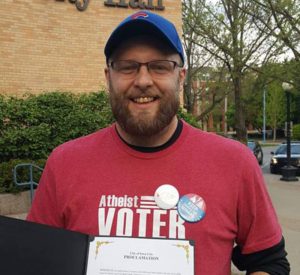This month the Iowa Statehouse moves closer to its “people’s house” nickname when first an atheist, and then a humanist, offer invocations from the well of the House chamber.
The General Assembly has a long-standing tradition of invocations, which are brief meditations or prayers. It’s become routine for lawmakers to invite people from around the state to offer these morning speeches, marking a solemn beginning to the legislative work day.
Throughout the years, a variety of religious and community leaders have spoken. Christian denominations hold the lion’s share of these appearances, but legislators also have heard from Jewish rabbis, Muslim imams, and one Wiccan priestess.
And now two secularists will join their ranks.
This Wednesday, Manchester native and atheist Justin Scott will lead the ceremony.
Then on April 17, Roxanne “Rocky” Gissler, president of Humanists of Linn County and a certified humanist celebrant, will take a turn in conjunction with “Reason on the Hill.” The event is another first in state politics featuring advocacy efforts by the state’s roughly 20 active secular groups.

These invocations make no national history — in the wake of the 2013 U.S. Supreme Court decision Greece v. Galloway, many secularists, humanists, freethinkers, agnostics and atheists have been included in similar traditions at government assemblies throughout the country, including a handful of local meetings here. But for Iowa state government, this is believed to be the first time non-theists will lead the ceremony.
Neither Scott nor Gissler have written what they’ll say during their 90-second appearances, but both have broad themes in mind.
“I’m going to try to incorporate the values we have as non-believers,” Scott said. “I want to try to invoke that, at the end of the day, all humans can do is rely on one another, on logic and reason.”
Noting that invocations by non-theists will be inherently different from those that call upon a higher power for assistance or guidance, Gissler said, “I want to impress on lawmakers and all Iowans to use our reasoning, our critical thought, and what we’ve gleaned from science and facts to serve all of the people of Iowa.”
Perhaps surprisingly, given the variety of people who have offered Statehouse invocations, most speakers have leaned toward more non-denominational messages designed to bring people together. Scott and Gissler tell me they will follow that tradition.

“I think what often gets forgotten is all of our leaders, regardless of what groups supported their campaigns, are making decisions that affect everybody in the state of Iowa. And, despite what some people believe, Iowa is diverse,” Gissler said.
“We’ve created our own problems, and we are the only ones who are going to fix it or make it better. We can do it. We have the capability, especially if we can call on our reason, facts, compassion and acceptance of others.”
Scott says he remembers coming out as an atheist and how lonely it can feel. He hopes inclusion of non-theists in this state tradition will signal non-believers that they aren’t alone, and that demographics are changing.
So, in an ideal world, April would be just another month at the Statehouse. Lawmakers will caucus, bills will be debated, opening ceremonies will take place and crowds of like-minded Iowans will raise public awareness.
But as we’ve unfortunately seen before, not all attempts of inclusion are viewed the same.
For those weary of partisanship and divisiveness, this is an opportunity to turn a page. Government needs frequent, gentle reminders that it serves people of many backgrounds.
Public servants must understand the growing diversity of Iowa encompasses not only many religions, but an ever-increasing contingent of people with no religion.
At their core, Statehouse invocations are dispatches from citizens to elected officials. Collectively, they represent our spirit, the things that we believe and hold dear.
All of this is Iowa. And there’s plenty of room for all of it to coexist under the golden dome.
This column by Lynda Waddington originally published in The Gazette on April 2, 2017. Photo credit: Rebecca F. Miller/The Gazette
